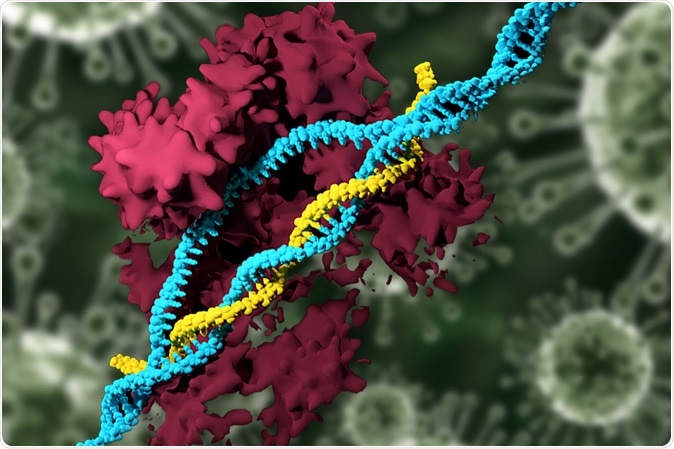Researchers from MIT have now developed nanoparticles that could carry CRISPR genetic editing systems deep within the cells and perform their functions on the DNA. The paper was published in the November issue of Nature Biotechnology.
In their study they used these nanoparticles with the gene editing systems to modify certain genes in mice. Until now the carriers of genetic editing systems have been modified viruses that the scientists have used for this purpose. With the development of these nanoparticles for use in this scenario, there is no need for the complicated viral based delivery systems.

In a new study, MIT researchers have developed nanoparticles that can deliver the CRISPR genome-editing system and specifically modify genes, eliminating the need to use viruses for delivery. Image Credit: MIT
In their study the researchers led by Koch Institute research scientist Hao Yin and colleagues who used these nanoparticles carrying the CRISPR systems to remove specific genes in almost 80 percent of the liver cells of the test mice. This is an unprecedented success with CRISPR ever achieved say experts. Daniel Anderson, an associate professor in MIT’s Department of Chemical Engineering and a member of MIT’s Koch Institute for Integrative Cancer Research and Institute for Medical Engineering and Science (IMES) says, “What’s really exciting here is that we’ve shown you can make a nanoparticle that can be used to permanently and specifically edit the DNA in the liver of an adult animal.”
The team targeted a particular gene called the Pcsk9 that controls levels of cholesterol. When this gene is altered or mutated, it leads to a condition of impaired cholesterol control levels called dominant familial hypercholesterolemia. There are two drugs that have been approved for use in this condition. These act by inhibiting the offensive gene. These however need to be taken continuously by the patient to control the disease. Use of these nanoparticles to edit these genes and remove the mutated parts could be one-time solution to the problem feel the researchers. Other liver diseases that are mediated by genes can also be treated in future with this technique they add.
The nanoparticles the team developed carry the DNA cutting tool which is an enzyme called Cas9. It also contains a short RNA sequence that can guide the Cas9 to the specific area so that it can make the cut and edit out the mutated gene. This is not the first time that the team led by Anderson and Yin managed a delivery system without using viruses as is traditional. They developed a similar delivery system in 2014 to treat the liver disorder tyrosinemia using gene editing tool CRISPR in an adult animal. This delivery system uses a high pressure injection technique that may damage some parts of the liver. This damage was prevented by the use of this short messenger RNA that could guide the CRISPR enzyme and now the need for the high pressure injection is eliminated.
According to Anderson, it was vital that a non-viral delivery system is developed. He explained that once these viruses are used, the body can develop antibodies against it. This makes their use the next time around difficult. The body now can react against the viral vehicle making it ineffective. Yin said the team modified the short RNA that could enhance its ability to detect and guide the Cas9 and improve its activity. With this they could successfully alter 80 percent of the liver cells he added. This led to a 35 percent reduction in the total cholesterol levels of the mice.
Anderson said that the liver is a vital organ that is the “source” of several diseases. If the DNA can be reprogrammed using this technique, when the liver is functional, several diseases can be treated. The study received financial support from National Institutes of Health (NIH), the Russian Scientific Fund, the Skoltech Center, and the Koch Institute Support (core) Grant from the National Cancer Institute.